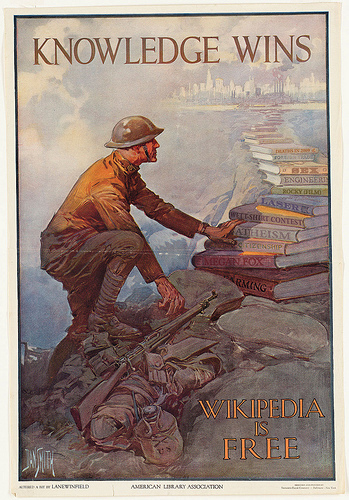 For a time, few issues could rally nerds as effectively as net neutrality. Whenever we heard those dreaded five syllables, we immediately ceased our latest exegesis of Watchmen and girded our neglected loins for battle.
For a time, few issues could rally nerds as effectively as net neutrality. Whenever we heard those dreaded five syllables, we immediately ceased our latest exegesis of Watchmen and girded our neglected loins for battle.
But for some of us, after so many false alarms, the threat of losing net neutrality has become something of a digital boogey man. Sure, now and then a corporation will get caught throttling bandwidth, but the chances for a wholesale elimination of neutrality still seem slim. When Comcast began its latest round of throttling, we didn't much care.
But, for the poorest users in the United States, net neutrality is already gone. Our woefully supported public libraries suffer from a critical bandwidth shortage, which practically compels a regime of Internet rationing. This state of things forces librarians into the role of Internet traffic police and provides a tested blue print to the champions of a tiered Internet.
A short time ago, the American Library Association (ALA) released the latest update to the Public Library Funding & Technology Study, a long running survey of public access to the Internet. The survey reveals that public libraries are the only point of free Internet access in the great majority of communities, and many libraries do not have enough bandwidth to meet the needs of their patrons. The entire situation is an embarrassing reminder that the US has a hideous Internet access rate.
While this problem is a common refrain (see here for similar examples of this story dating back to 2000), the current recession has pushed many formerly employed users onto free networks. In response, libraries are either capping the bandwidth of certain kinds of content (no longer just a euphemism for porn) or cutting public access altogether.
While the latter approach is certainly disconcerting (especially in a country with such poor per capita connectivity), I am terrified by the former bandwidth austerity measure. Libraries have become a proving ground for two dangerous arguments: that content throttling is not filtering and that resource limitations justify content throttling.
Naturally, we don’t like being told what we can and cannot read or view. So filtering quickly becomes the F-word , especially when the content being blocked is non-pornographic. But as the librarians of Greensboro (and incidentally the leaders of Iran) have realized, if you just slow traffic to a crawl, you have all the advantages of censorship without any of the blowback. Throttling, or bandwidth/traffic shaping, allows the end provider to categorize and cripple web activities: so while the New York Times loads quickly, Facebook arrives at a glacial pace. Think of throttling as a passive-aggressive waitress—you’ll get what you order, but it will no longer be warm.
There are several reasons to be concerned by this development. Paramount among them is that libraries are providing a model of the “congestion forces throttling” argument that telecoms regularly trot out.
Telecoms claim that if they don’t slow traffic, the tubes of the Internet will burst. This is debatable. What is not debatable is the fact that throttling or banning is a great way to protect your market share. Comcast has been caught throttling the download of very large files, possibly because users who are downloading video are less likely to be consuming content from Comcast Cable. For a long while, AT&T blocked a Skype app for the iPhone, claiming that it would cause too much congestion (and probably reduce the sales of huge voice plans). The FCC essentially forced AT&T to back down from this position a month ago, but we are still waiting on approval for other long delayed apps (Google Voice anyone?). Oh, and throttling is also a great way to avoid upgrading infrastructure (“Enjoy Unlimited Downloads—Limit 3 per day”).
So yeah, I am lighting the signal fire and calling on nerds everywhere to fight the barbarians at the gate. (Quick! To the Internet!) We already have plenty of reasons to support local libraries, but now we have another. The local library threatens to become a fifth column in the war for net neutrality. By channeling funds to libraries and to digital infrastructure, we can prevent a regime of bandwidth apartheid.
*Note: To be clear, I do not think that libraries are technically violating net neutrality. The library (the ALA strongly supports NN) is not an ISP nor is it profiting from the enforcement of tiered access. But libraries are severely limiting bandwidth for streaming media sites like YouTube or social networks like MySpace. This is not the simple, justified filtering of pornography. Social networks are especially valuable in a recession because they offer cheap entertainment as well as an avenue for job seekers.
(Andrew Moshirnia is a second-year law school student at Harvard Law School and a CMLP blogger. He thinks that's not fair. That's not fair at all. There was time now. There was all the time he needed... ! It's not fair!")




